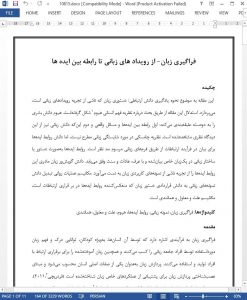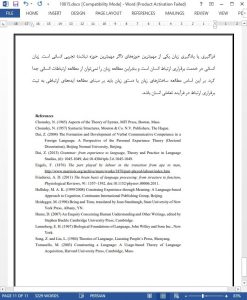ABSTRACT
This paper addresses the issue of how people derive relational/grammatical knowledge of language from experience of language instances. The argument of the paper is framed through discussion of Hume’s theory of human understanding. Hume classified human knowledge into two kinds: relations of ideas and matters of fact, and the knowledge of language is also viewed from this theoretical perspective. Chomsky’s theory of linguistic competence is nothing but the knowledge of the relations of ideas intended to express in the process of communication through conventional language forms. The relations of ideas are verbalized and conventionalized in a particular language as the grammar or language structures. The native speaker’s knowledge of these relations of ideas derives from his experience of instances of language in use. The mechanisms of the mental operation of transformation from knowledge of language instances to knowledge of grammatical conventions reflecting the relations of ideas in communication are cause and effect, and similarity.
INTRODUCTION
Language acquisition refers to the process by which human beings, especially children, acquire the ability to perceive and comprehend language used by people of the language community, as well as produce and use the learned language to communicate with them. Language processing is considered as one of the quintessential traits of human species, and the neurobiological basis of language processing has been identified to support particular language functions (Friederici, 2011). Nonhumans do not communicate in language, and no matter what efforts humans have made to teach them human language, they have never demonstrated or developed the capacity of learning and speaking any human language. The increase of knowledge of the neurobiological basis of language only proves the existence of the biological foundations of language predicted by Lenneburg (1967).
CONCLUSION
Even though Hume lived more than two hundred years ago, his argument against theories of innate ideas is still outstanding in the literature review. Linguists or even psychologists usually confine themselves to the direct problems they intend to address and rarely go beyond the scope of discipline to view the issue from a philosophical point of view. The behavioral tradition of psychology restricted itself to the external behavior of animals and humans in order to understand the internal psychological or mental operations. Likewise, the cognitive tradition of psychology since the 1950s has been limited to the cognitive schema or structures or relations or connections. Language acquisition or learning is one of the most important areas (if not the most important) of human experience. Human language serves human communication, and therefore the study of language cannot be detached from the study of human communication. Accordingly, the study of grammar or language structures should be based on the study of the relational ideas in the communicative intention in the process of human interaction.









